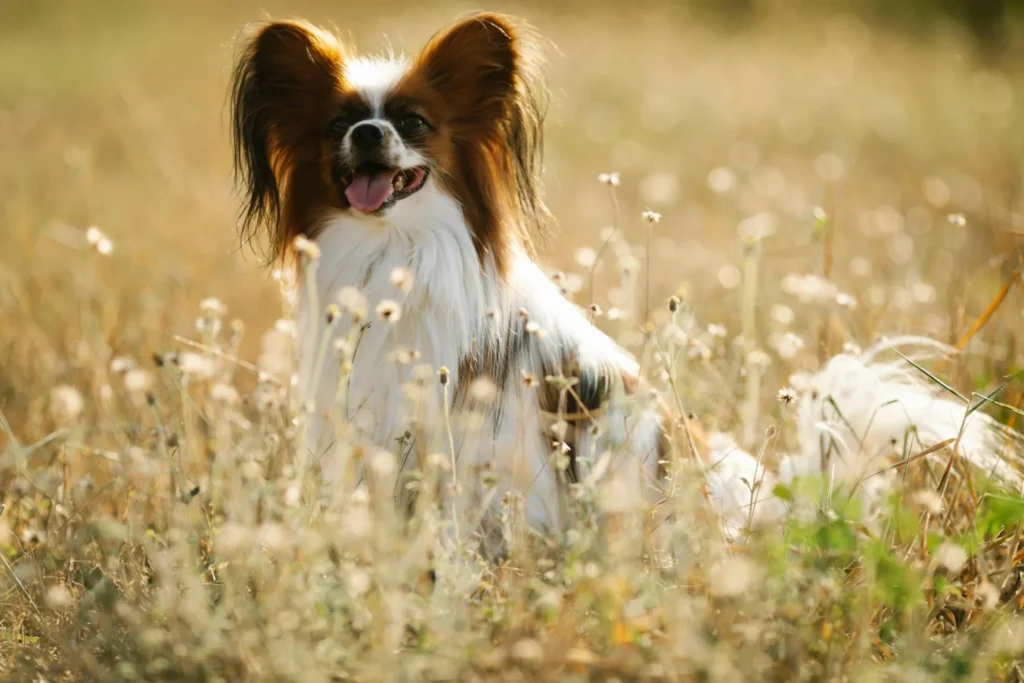Introduction: The Brilliant World of Poodles
Poodles, with their elegant stance and curly coats, have long been admired for their beauty. But beneath those fluffy exteriors lies a mind that’s sharp as a tack. In this deep dive, we’ll explore the fascinating world of poodle intelligence, uncovering which variety might claim the title of the smartest. Buckle up for a journey through poodle smarts, from fluffy puppyhood to wise senior years! 🐾🎓
Poodle Basics: Meet the Fabulous Fluffballs 🐩
Before we dive into the battle of the brains, let’s get acquainted with our curly-coated contenders:
Poodle Varieties:
- Standard Poodle: The largest, standing over 15 inches tall
- Miniature Poodle: Mid-sized, between 10-15 inches
- Toy Poodle: The tiny tot, under 10 inches
All poodles, regardless of size, share a common ancestry and those trademark smarts. But does size matter when it comes to intelligence? We’ll find out!
The Poodle Brain: Built for Brilliance 🧠
Poodles didn’t just wake up one day and decide to be smart. Their intelligence is the result of centuries of selective breeding. Here’s what makes the poodle brain special:
- Highly developed problem-solving skills
- Excellent memory
- Quick learning ability
- Strong desire to please
These traits combine to create a dog that’s not just trainable, but truly intelligent.
Measuring Canine Cognition: How Do We Know They’re Smart? 📏
Determining dog intelligence isn’t as simple as giving them an IQ test. Researchers and trainers use various methods:
- Obedience testing: How quickly do they learn new commands?
- Problem-solving tasks: Can they figure out puzzles?
- Memory tests: How well do they remember learned behaviors?
- Adaptive intelligence: How well do they solve new problems?
Poodles consistently rank high in all these areas. But which variety comes out on top?
The Great Poodle Intelligence Showdown 🏆
Let’s break down the smarts of each poodle variety:
| Variety | Learning Speed | Problem-Solving | Memory | Adaptability |
|---|---|---|---|---|
| Standard | Very Fast | Excellent | Exceptional | High |
| Miniature | Fast | Very Good | Great | High |
| Toy | Fast | Good | Good | Moderate |
While all poodles are smart, the Standard Poodle often edges out its smaller cousins in cognitive tests. But why?
Why Standard Poodles Might Have the Edge 🥇
Several factors contribute to the Standard Poodle’s intellectual prowess:
- Larger brain size: More neural connections
- Working history: Bred for complex tasks like retrieving
- Greater physical capability: Can perform a wider range of tasks
However, this doesn’t mean Miniature and Toy Poodles are slouches in the smarts department!
Miniature Marvels: The Middle Ground of Intelligence 🏅
Miniature Poodles offer a perfect blend of Standard smarts in a more compact package:
- Highly trainable: Quick to pick up commands
- Great for agility: Combine smarts with athleticism
- Excellent memory: Remember commands for long periods
They’re often chosen for complex roles like therapy dogs, showcasing their intellectual capabilities.
Toy Poodles: Tiny Bodies, Big Brains 🥉
Don’t let their size fool you – Toy Poodles pack a lot of intelligence into their small frames:
- Quick learners: Despite their size, they learn rapidly
- Excellent for trick training: Their size and smarts make them great performers
- Adaptable: They navigate the human world with ease
While they might not have the raw problem-solving power of their larger cousins, Toy Poodles are still incredibly intelligent dogs.
Nature vs. Nurture: The Role of Environment in Poodle Intelligence 🌱
It’s not just genetics that determine a poodle’s smarts. Environment plays a huge role:
- Early socialization: Exposure to various stimuli enhances cognitive development
- Training consistency: Regular, positive reinforcement boosts learning
- Mental stimulation: Puzzles and games keep the poodle brain sharp
- Diet and health: Proper nutrition supports cognitive function
A well-cared-for poodle of any size can outshine a neglected one, regardless of variety.
Poodle Intelligence Through the Ages: From Puppy to Senior 👶👴
Poodle smarts evolve as they age:
| Age Stage | Cognitive Development |
|---|---|
| Puppy (0-1 year) | Rapid learning, establishing foundations |
| Young Adult (1-3 years) | Peak learning ability, high energy |
| Adult (3-7 years) | Refined skills, steady intelligence |
| Senior (7+ years) | Maintained skills, potential cognitive decline |
Proper care and stimulation can help maintain poodle intelligence well into their golden years.
The Pros and Cons of Poodle Smarts 👍👎
Having a brilliant poodle isn’t always a walk in the park. Let’s weigh the pros and cons:
Pros:
- Highly trainable
- Excellent companions
- Versatile (therapy, service, sport)
- Low-shedding (great for allergy sufferers)
Cons:
- Can be stubborn if bored
- Need constant mental stimulation
- May outsmart inexperienced owners
- Can develop anxiety if under-stimulated
Poodles vs. The World: How They Stack Up 🌍
Poodles consistently rank in the top 5 most intelligent dog breeds. Here’s how they compare:
- Border Collie
- Poodle
- German Shepherd
- Golden Retriever
- Doberman Pinscher
This ranking considers factors like obedience, working intelligence, and adaptive learning.
The Poodle Brain in Action: Real-World Applications 🏋️♀️
Poodles put their smarts to work in various fields:
- Service dogs: Guiding, hearing assistance
- Therapy animals: Hospital and nursing home visits
- Search and rescue: Especially Standard Poodles
- Competitive obedience: Excelling in dog sports
- Acting: Featuring in shows and commercials
Their versatility is a testament to their intelligence across all varieties.
Nurturing Poodle Noggins: Tips for Mental Stimulation 🧩
Keep your poodle’s mind sharp with these activities:
- Puzzle toys: Hidden treat games
- Obedience training: Regular sessions with new commands
- Agility courses: Even indoor setups for smaller varieties
- Scent work: Hide-and-seek with favorite toys
- Interactive play: Games that require problem-solving
Remember, a tired poodle is a happy poodle – mentally and physically!
The Dark Side of Smarts: When Intelligence Becomes a Challenge 😈
Poodle smarts can sometimes lead to troubles:
- Boredom-induced mischief: Destructive behavior when under-stimulated
- Manipulation: Learning to outsmart owners for treats or attention
- Anxiety: Overthinking can lead to stress in sensitive poodles
- Stubbornness: Using their intelligence to resist training they deem unnecessary
The key is to channel their intelligence positively through consistent training and stimulation.
Poodle IQ Boosters: Nutrition for the Canine Brain 🍎
Feed your poodle’s body and mind with these brain-boosting foods:
- Omega-3 fatty acids: Found in fish oil, great for cognitive function
- Antioxidants: Blueberries and other fruits support brain health
- Quality proteins: Essential for neurotransmitter production
- Vitamin E: Supports overall brain health
Always consult with your vet before making significant changes to your poodle’s diet.
The Bilingual Poodle: Language Learning Abilities 🗣️
Poodles have an impressive capacity for understanding human language:
- Can learn hundreds of words
- Understand tone and context
- Some poodles have shown the ability to differentiate between objects based on names
This linguistic aptitude contributes significantly to their overall intelligence ranking.
Poodle Prodigies: Exceptional Cases of Canine Cognition 🏆
While all poodles are smart, some have shown extraordinary abilities:
- Nari: A Standard Poodle who can identify over 1000 toys by name
- Chaser: While not a poodle, this Border Collie’s feat of learning 1022 nouns shows the potential of canine cognition
These exceptional cases highlight the incredible potential of the canine mind, with poodles often at the forefront of such achievements.
The Science Behind Poodle Smarts: Neurological Insights 🔬
Recent studies have shed light on the poodle brain:
- Increased neural plasticity: Allows for quicker learning and adaptation
- Developed prefrontal cortex: Associated with complex problem-solving
- Strong hippocampal function: Contributes to their excellent memory
These biological factors contribute to the poodle’s impressive cognitive abilities across all varieties.
Training Techniques for the Intelligent Poodle 🎓
Harness your poodle’s smarts with these training approaches:
- Positive reinforcement: Rewards-based training works best
- Consistency: Regular, short training sessions
- Variety: Introduce new commands and challenges regularly
- Patience: Allow them to problem-solve on their own
- Advanced techniques: Teach multi-step commands for mental stimulation
Remember, each poodle is an individual – tailor your approach to their unique personality and learning style.
The Future of Poodle Intelligence: Ongoing Research 🔮
Exciting developments are on the horizon in canine cognition studies:
- Brain mapping: More detailed understanding of canine neural pathways
- Genetic studies: Identifying genes associated with intelligence
- Comparative cognition: How poodle intelligence relates to other species, including humans
- Aging and cognition: Developing strategies to maintain cognitive function in senior poodles
These studies promise to deepen our understanding of poodle intelligence across all varieties.
Conclusion: Celebrating Poodle Brilliance in All Sizes 🎉
While Standard Poodles might have a slight edge in cognitive tests, the truth is that all poodle varieties are exceptionally intelligent. The key to having a smart, well-adjusted poodle lies not in choosing the “smartest” variety, but in providing the right environment, training, and care for your individual dog.
Whether you have a statuesque Standard, a marvelous Miniature, or a tiny Toy, your poodle has the potential to be a canine Einstein. Nurture their natural intelligence, provide plenty of mental and physical stimulation, and you’ll have a brilliant, happy companion for years to come.
Remember, the smartest poodle is the one that fits perfectly into your life and heart! 🐩💖
FAQs About Poodle Intelligence 🤔
- Q: Are poodles really the second smartest dog breed?
A: According to Stanley Coren’s intelligence rankings, yes. However, intelligence in dogs is complex and multifaceted. - Q: Can poodles learn tricks faster than other breeds?
A: Generally, poodles are quick learners and can pick up new tricks rapidly, often faster than many other breeds. - Q: Do smaller poodles (Toy and Miniature) live longer than Standard Poodles?
A: On average, smaller poodle varieties tend to have slightly longer lifespans than Standard Poodles. - Q: How can I test my poodle’s intelligence at home?
A: You can use puzzle toys, teach new tricks, or play hide-and-seek games to gauge your poodle’s problem-solving skills and memory. - Q: Are male or female poodles smarter?
A: There’s no significant difference in intelligence between male and female poodles. Individual personality and training play a bigger role. - Q: Can poodles be trained as service dogs?
A: Yes, poodles, especially Standard Poodles, are often trained as successful service dogs due to their intelligence and trainability. - Q: How often should I provide mental stimulation for my poodle?
A: Daily mental stimulation is ideal. This can include training sessions, puzzle toys, or interactive games. - Q: Do poodles get bored easily?
A: Yes, due to their high intelligence, poodles can get bored if not provided with adequate mental and physical stimulation. - Q: Can poodles learn multiple languages?
A: While poodles can’t truly understand multiple languages, they can learn commands in different languages if taught consistently. - Q: How does poodle intelligence compare to human intelligence?
A: While poodles are highly intelligent for dogs, their cognitive abilities are different from humans. They excel in areas like scent detection and emotional intelligence, but can’t perform complex abstract reasoning like humans.



